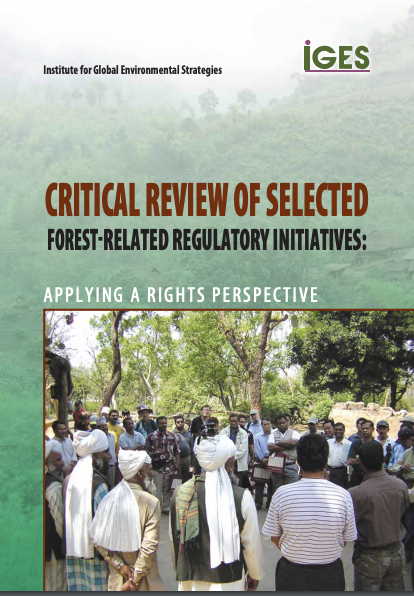Critical Review of Selected Forest-Related Regulatory Initiatives
This report brings together four studies that evaluate regulatory initiatives with implications for forest-dependent communities from a rights-based perspective. These are: The Scheduled Tribes and Other Traditional Forest Dwellers (Recognition of Forest Rights) Act, 2006 – India; Regulatory initiatives and selected outcomes of judicial processes in Malaysia; The Community Forest Act (2007) – Thailand; and The Indigenous People’s Rights Act (1997) – Philippines. Each study covers law making, content and implementation.
Simulation of the Effect of Intensive Forest Management on Forest Production in Sweden
The effects of intensifying the management of 15% of the Swedish forest land on potential future forest production over a 100-year period were investigated in a simulation study.
Assessing Bioenergy Harvest Risks: Geospatially Explicit Tools for Maintaining Soil Productivity in Western US Forests
Biomass harvesting for energy production and forest health can impact the soil resource by altering inherent chemical, physical and biological properties. These impacts raise concern about damaging sensitive forest soils, even with the prospect of maintaining vigorous forest growth through biomass harvesting operations. Current forest biomass harvesting research concurs that harvest impacts to the soil resource are region- and site-specific, although generalized knowledge from decades of research can be incorporated into management activities.
REDD+ and the Indigenous Question: A Case Study from Ecuador
One of the main issues regarding the implementation of REDD+ in Latin America has been the growing concern that such projects may infringe upon the rights and negatively affect the livelihoods of forest-dependent communities. Various indigenous and civil society organizations are ardently opposed to the initiative. Such is the case in Ecuador, where indigenous opposition to REDD+ represents a considerable obstacle in the creation of a national strategy since more than 60% of the country’s remaining forest cover is on indigenous land or under indigenous occupation.
An Ecosystem Approach to Recreation Location Quotients
Despite the widespread agreement on the importance of preserving ecological integrity in conservation and outdoor recreation decision-making processes, traditional metrics analyzing the supply of and demand for conservation and recreation resources have focused on geographical and population-centric units of measurement rather than ecological ones. One tool past researchers have used to inform recreation resource planning is the recreation location quotient (RLQ).
Decentralization and REDD+ in Brazil
Recent discussions on REDD+ (Reducing Emissions from Deforestation and Forest Degradation, plus conservation, sustainable management of forests and enhancement of forest carbon stocks) have raised optimism about reducing carbon emissions and deforestation in tropical countries. If approved under the United Nations Framework Convention on Climate Change (UNFCCC), REDD+ mechanisms may generate a substantial influx of financial resources to developing countries.
People, Governance and Forests—The Stumbling Blocks in Forest Governance Reform in Latin America
This article examines common barriers to achieving adequate levels of forest resource governance in countries of Latin America. It looks at the deficiencies of the policy and regulatory frameworks affecting forests, the common failure to impose the rule of law, the main factors that constrain the effectiveness of government actions in the forest sector and at the political barriers to introducing reforms for change in governance structures. The elimination of these barriers acquires new importance in the implementation of successful REDD+ programs in the countries of the region.








